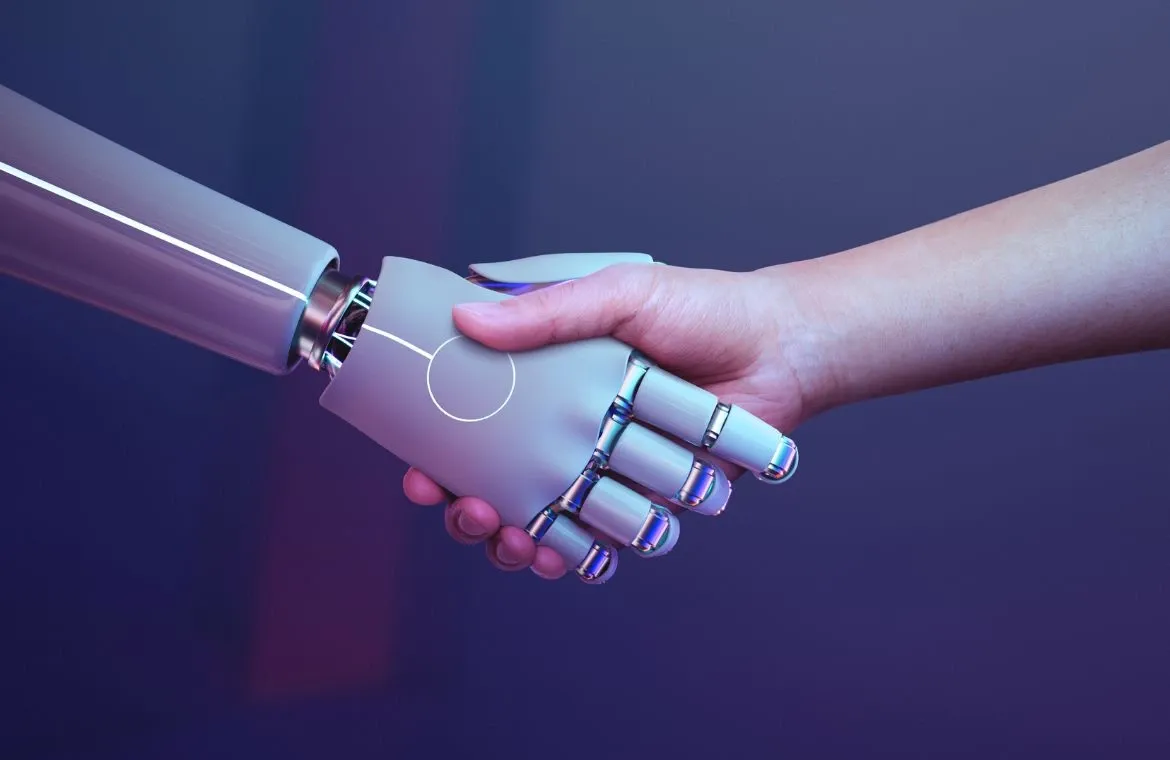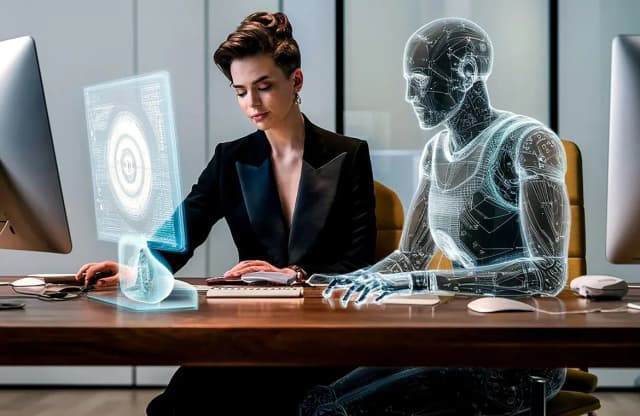The Surprising Facts: Will AI Replace Human Jobs or Make New Ones?

Are you afraid of AI stealing your job? You’re not alone. But beyond the panic, there’s a more balanced reality.
From Bengaluru’s IT corridors to the farms of Andhra Pradesh, AI is making its mark, not by pushing people out, but by partnering with them.
Instead of fearing the rise of AI, it’s time to understand it. With insights from India’s leading tech, education, and healthcare sectors, we’ll uncover how AI is shaping new roles, amplifying human potential, and why learning how to work with AI may be your greatest career move yet.
The Current Impact of AI in the Market
As far as we can see, AI is everywhere, from head to toe. From north to south and east to west, everything is getting impacted by AI. So in today’s business world, AI’s impact seems to be complex and Layered, involving both displacement and replacement of roles and responsibilities.
Improving efficiency
AI is helping to increase efficiency and productivity by automating and handling mundane tasks, such as customer interactions, logistics, and finance. AI helps logistics companies optimise their routes and cut empty travel miles. This results in lower fuel consumption and reduced carbon emissions. The financial sector has seen AI automate many manual processes while revolutionising how banks interact with customers.
For example, ICICI Bank utilizes AI-driven tools to automate loan approvals and detect fraud, thereby speeding up operations while reducing human error.
Reducing the costs
AI is helping businesses reduce their expenses. By combining process redesign with generative AI tools, businesses can save costs, and customer service teams can cut the time spent writing manual responses.
For example, Airtel’s conversational AI assistant, Airtel Thanks, handles millions of queries, helping the company reduce call center costs.
Better Decision Making
AI is working to enhance decision-making processes for businesses. The AI-powered analytics tools are helping to improve the data-driven decision-making process, including risk management and research allocation.
For example, Reliance Retail utilizes AI for customer trend analysis, enabling it to determine which products to stock based on local purchasing patterns.
Automation vs. Human Creativity
The biggest difference between tasks machines can automate and those that require human creativity defines how AI affects employment. Professionals must understand this boundary to navigate their career paths in an AI-enhanced workplace.
What AI can automate today?
AI excels at handling repetitive, data-intensive tasks across various industries. AI systems in retail and logistics optimise inventory management and transportation routes. These systems have reduced empty travel miles. AI-powered applications in finance can review legal documents in seconds, a task that once needed thousands of human hours.
Where human creativity still leads?
Human creativity maintains key advantages despite AI's quick progress. While AI chatbots outperform the average human in generating creative ideas, the most creative individuals still produce better-quality ideas than AI. This suggests that AI can broadly replicate creativity, but it cannot match human creativity at its finest.
People's creativity uniquely blends emotional intelligence, contextual understanding, and divergent thinking. Yes, humans excel at connecting unrelated concepts, challenging assumptions, and creating truly novel solutions, skills that AI systems find hard to replicate.
Benefits of AI in the Workplace
AI brings transformative benefits to the workplace by enhancing human capabilities rather than replacing them. Job displacement concerns exist, but the advantages are worth noting.
Reducing repetitive tasks
AI automates routine operations, which creates major time and productivity gains. This allows professionals to focus on strategic initiatives. Businesses of all types benefit from this automation in areas like data entry, scheduling, preliminary research, and reporting.
Improving decision-making with data
Business decisions have undergone significant transformations with the advent of AI's advanced data analysis capabilities. AI spots patterns and trends in huge information sets that human analysts can't process. Healthcare organisations analyse patient data and medical literature with AI to support evidence-based treatment choices.
Improving productivity and innovation
AI implementation leads to substantial productivity gains. AI stimulates growth by accelerating product development, enhancing operations, and identifying new ways to meet customer needs. To name just one example, fashion brand Stitch Fix exploits customer priorities and fashion trends data to create unique shopping experiences.
Creating more tailored customer experiences
AI enables unprecedented personalization through the deep analysis of customer behavior and priorities. And nowadays, consumers expect personalised interactions and feel frustrated when businesses fail to deliver tailored experiences. Most consumers choose, recommend, or pay more for brands that offer personalised services.
Will AI Create New Jobs or Just Replace Old Ones?
The employment landscape of tomorrow extends beyond job replacement, representing a fundamental transformation. We're witnessing work itself being reshaped as AI revolutionises industries.
The move from task-based to skill-based roles
AI isn't eliminating entire professions; instead, it is redefining how we think about jobs. This means everyone's role will be new by the end of the decade as requirements change fundamentally. Companies now view positions as collections of evolving skillsets rather than rigid job titles.
AI's creation of new skill requirements
Professionals are adapting faster to these changes. The "five Cs" - curiosity, compassion, creativity, courage, and communication - have become the enduring skills of the AI economy. One expert puts it simply: "Soft skills are the new hard skills".
Examples of industries hiring for AI-related roles
AI expertise is in high demand across sectors. Active recruiting industries include:
- Technology: showing the highest AI job growth potential at 39% over five years
- Finance: looking for specialists in risk management and fraud detection
- Healthcare: needing experts for early illness detection and medical records management
- Manufacturing: seeking talent for predictive maintenance and operational efficiency
The impact of AI on employment has created a hybrid workforce where human and artificial intelligence work together, rather than compete.
Future of Work: AI Encounters
AI integration in the workplace continues to accelerate at an unprecedented rate. It changes how organisations work and what employees do.
How workplaces are adapting to AI
Workplaces are adapting to AI by utilizing it to streamline everyday tasks, making them faster, easier, and more efficient. Instead of replacing jobs, AI is helping people focus on more important and creative work. Organizations now utilize AI to automate repetitive tasks, such as data entry, email sorting, and scheduling. In HR, AI helps screen resumes and set up interviews, making hiring quicker and smarter
The importance of upskilling and reskilling
Upskilling helps individuals gain expertise in AI tools and techniques, opening up new career opportunities and enhancing their ability to solve complex problems. Reskilling, on the other hand, allows workers from non-tech backgrounds to transition into AI-driven roles, helping bridge the growing skills gap in the market. For businesses, investing in employee learning ensures smoother AI adoption and drives innovation.
Why human-AI collaboration is the future
Teams of humans and AI perform better than either one alone. Even when conditions favour automation, showing how human and machine abilities complement each other.
The best systems let humans stay in control with clear oversight rules. AI excels at finding patterns and making predictions, while people provide context, intuition, and ethical guidance. What excites experts isn't just the technology, it's what people can do with it. We're moving toward workplaces where everyone is more capable and connected than ever.
Conclusion
AI's relationship with employment goes well beyond simple replacement stories. Our exploration in this article gave us a clear picture that AI automates specific tasks in administrative work, customer service, and entry-level programming. Yet it creates new opportunities that require different skills. Many jobs remain resistant to automation, especially when you have roles needing emotional intelligence, ethical judgment, and complex physical interactions.
You should see AI as a force that reshapes the workplace rather than a threat. Evidence shows a hybrid future where humans and AI work together and perform better than either alone.
This is where AI courses come in. They help you understand how these technologies work under the hood, and if you're looking to speak the language of the future, mastering Generative AI and prompt engineering is a great first step. These courses enable you to collaborate with AI systems, not compete with them, whether it’s writing code, generating content, or making strategic decisions.
Meanwhile, a Certificate Program in Artificial Intelligence and Emerging Technologies takes it a step further. They help you explore not just AI, but also blockchain, quantum computing, IoT, and beyond, so you're not just preparing for today, but future-proofing yourself for the next decade
Therefore,
“AI won’t take your job, but someone who knows how to use it will.”
Frequently Asked Questions
Q1. Will AI completely replace human workers?
While AI will automate certain tasks, it's unlikely to replace humans in most jobs fully. Instead, AI is expected to augment human capabilities, allowing workers to focus on more strategic and creative aspects of their roles. Less than 5% of occupations can be fully automated, but many jobs will see partial automation of routine tasks.
Q2. Which industries are most likely to be affected by AI?
AI is impacting various sectors, including manufacturing, administrative work, customer service, and retail. However, jobs requiring emotional intelligence, complex problem-solving, and human interaction, such as healthcare, education, and skilled trades, are less likely to be replaced by AI.
Q3. What new job opportunities is AI creating?
AI is generating new roles in areas such as AI development, cybersecurity, data analysis, and AI ethics. Specific positions like prompt engineers, AI trainers, and health tech implementation specialists are emerging. The World Economic Forum projects AI will create approximately 97 million new jobs by 2025 across various industries.

TalentSprint
TalentSprint is a leading deep-tech education company. It partners with esteemed academic institutions and global corporations to offer advanced learning programs in deep-tech, management, and emerging technologies. Known for its high-impact programs co-created with think tanks and experts, TalentSprint blends academic expertise with practical industry experience.



